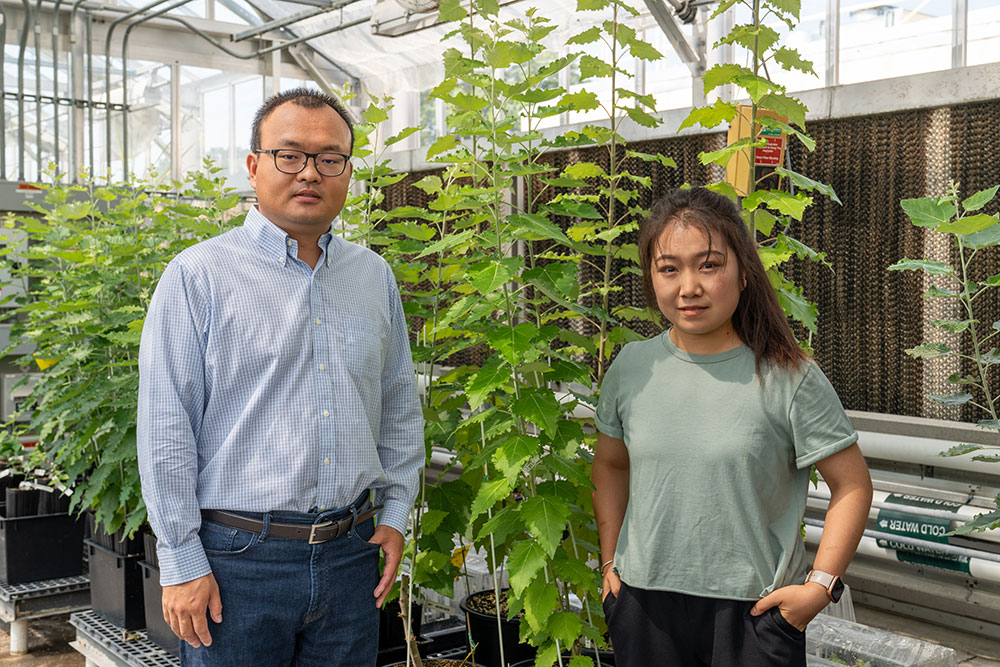
Brookhaven National Laboratory Research Team Identifies Key Protein for Larger, Tougher Crops for Fuel, Bioproducts
September 10, 2025| |
Biologists at Brookhaven National Laboratory have identified a plant protein that plays a crucial role in three key biological processes in poplar plants: iron deficiency responses, cell wall biosynthesis, and the creation of disease-fighting molecules. The research team published their study in The Plant Biotechnology Journal.
The researchers found that the gene PtrbHLH011 regulates these processes in poplar plants. By "knocking out" this gene, they were able to engineer plants that grew taller, had increased iron content, and produced more energy, which in turn supported the synthesis of valuable bioproducts, such as lignin and flavonoids. The discovery holds significant promise for developing more resilient and productive bioenergy crops. The increased iron content in the engineered plants enhanced photosynthesis, enabling them to produce more energy to support growth. The surge in flavonoid synthesis is particularly important for bio-preparedness efforts, as these molecules help protect plants from disease. This new understanding of how plant genes and proteins work could lead to the creation of crops that can thrive even on iron-deficient, marginal land.
Traditionally, researchers have focused on increasing the sugar content in plant cell walls for biofuels. However, this study also highlights the potential of lignin, a rigid cell wall component, which can be used to produce industrial bioproducts such as cement and adhesives. The researchers are now working to fine-tune the expression of specific target genes to further leverage the findings from this study, with the ultimate goal of strengthening crops' resistance to pathogens and increasing biomass yield.
For more details, read the article in Brookhaven National Laboratory Newsroom.
| |
You might also like:
- AI Tool MorphPod Automates Plant Fruit Measuring to Breed Better Crops
- Gene Editing Helps Identify Genetic Module Regulating Soybean Seed Traits
- IRRI Scientists Identify Rice Gene Variant that Boosts Yield Under Drought
Biotech Updates is a weekly newsletter of ISAAA, a not-for-profit organization. It is distributed for free to over 22,000 subscribers worldwide to inform them about the key developments in biosciences, especially in biotechnology. Your support will help us in our mission to feed the world with knowledge. You can help by donating as little as $10.
-
See more articles:
-
Plant
- Australian Grain Technologies Releases World's First Dual Herbicide Tolerant Barley
- Researchers Identify Soybean Gene Enhancing Yield and Quality
- Study Reveals Barriers Slowing GM Crop Adoption in India
- Nigeria Plans to Introduce GMO Labeling to Build Public Trust and Transparency
- APHIS Deregulates Bioengineered Blue-Purple Moth Orchid
-
Food
- ASCA8 Sets Vital Platform for Training, Collaboration, and Sustainability
-
Environment
- Brookhaven National Laboratory Research Team Identifies Key Protein for Larger, Tougher Crops for Fuel, Bioproducts
- Kobe University Engineers Bacteria to Create Biodegradable Plastic Alternative
-
Read the latest: - Biotech Updates (December 17, 2025)
- Gene Editing Supplement (December 17, 2025)
- Gene Drive Supplement (February 22, 2023)
-
Subscribe to BU: - Share
- Tweet

